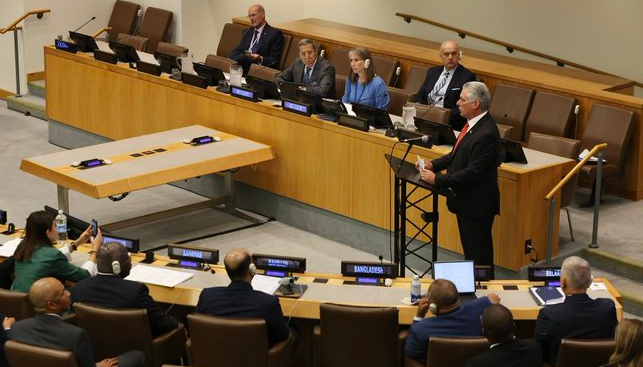Cuban President Miguel Díaz-Canel said Wednesday in New York that his country offers its technological and scientific capabilities and human resources to help prevent, prepare for and respond to present and future pandemics.
During his second speech of the day at the High-Level Segment of the 78th regular session of the UN General Assembly, this time at the meeting on Pandemic Prevention, Preparedness and Response, the Head of State recalled that “COVID-19 imposed on us a sad and bitter lesson from which we are obliged to learn”.
The health emergency “revealed the fragility of health systems and laid bare the cruelty of the inequities that characterize the world,” he said.
“During the Covid-19 pandemic, the U.S. government applied temporary humanitarian exemptions to countries that were victims of its unilateral coercive measures,” he added and recalled that Cubans were “excluded from that temporary humanitarian relief.”
“Even worse,” he pointed out, “while the pandemic was claiming millions of lives on the planet, the criminal blockade against Cuba intensified to unprecedented levels and generated difficulties and delays for the arrival of essential medical supplies and equipment to face it, in particular, for the industrialization of Cuban vaccines.
Díaz-Canel added that even the acquisition of medical oxygen in third countries and the supply of pulmonary ventilators were hindered.
He stressed that “despite the adversities, our biopharmaceutical industry and the potential of Cuban scientists allowed us to create in record time, three vaccines and two vaccine candidates against Covid-19”.
The Cuban president emphasized that while at the worst moment of the pandemic the transnational corporations and the richest states of the West were hoarding the necessary means to fight the disease, Cuba collaborated by sending 58 medical brigades to 42 countries and territories, which joined the more than 28 thousand of our health professionals who at that time were providing services in 59 nations.
For this reason, he ratified that COVID-19 “showed that global cooperation is a necessity, not a choice”.
In that sense, he pointed out that “Cuba advocates for the adoption of a robust international instrument for the prevention, response and recovery from pandemics, under the leadership of the World Health Organization”
“We call for the adoption of universal, redistributive and solidarity-based policies, with the commitment to leave no one behind,” the ruler sentenced.
He said that we are ready to develop scientific and health exchanges with interested countries, and provide advice to promote international collaboration.
The president reiterated that in this mission Cuba also makes available to all, its epidemiological, clinical and laboratory protocols, the results of research in the development of next-generation innovative drugs, as well as those of scientific research.
“Each country can and must contribute what is within its reach,” he said, because “the benefits must be universally accessible to all,” said President Díaz-Canel, concluding that “to advance along this path, you can always count on Cuba”.


